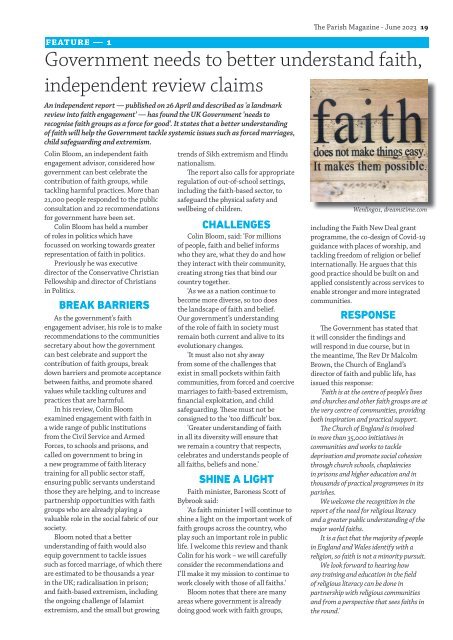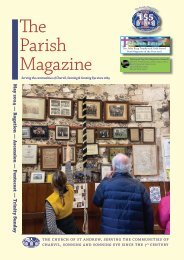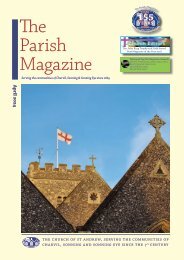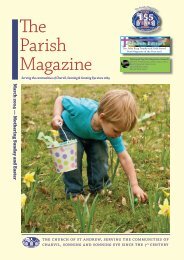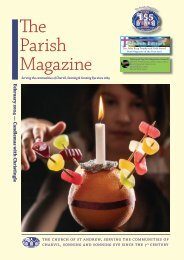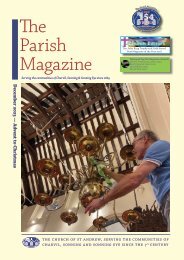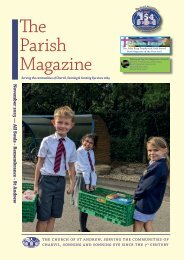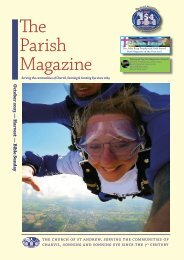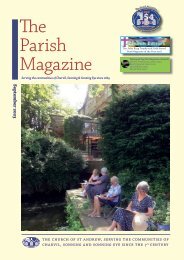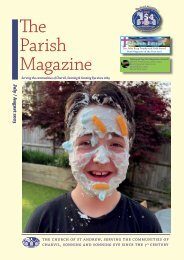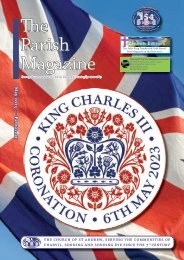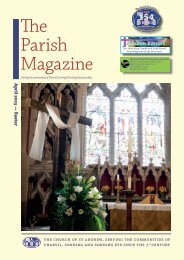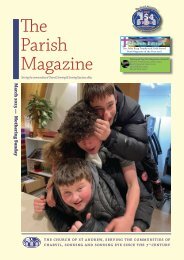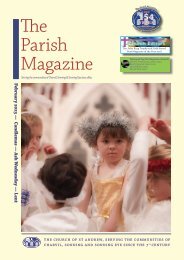The Parish Magazine June 2023
Serving the communities of Charvil, Sonning, and Sonning Eye since 1869
Serving the communities of Charvil, Sonning, and Sonning Eye since 1869
You also want an ePaper? Increase the reach of your titles
YUMPU automatically turns print PDFs into web optimized ePapers that Google loves.
feature — 1<br />
An independent report — published on 26 April and described as 'a landmark<br />
review into faith engagement' — has found the UK Government 'needs to<br />
recognise faith groups as a force for good'. It states that a better understanding<br />
of faith will help the Government tackle systemic issues such as forced marriages,<br />
child safeguarding and extremism.<br />
Colin Bloom, an independent faith<br />
engagement advisor, considered how<br />
government can best celebrate the<br />
contribution of faith groups, while<br />
tackling harmful practices. More than<br />
21,000 people responded to the public<br />
consultation and 22 recommendations<br />
for government have been set.<br />
Colin Bloom has held a number<br />
of roles in politics which have<br />
focussed on working towards greater<br />
representation of faith in politics.<br />
Previously he was executive<br />
director of the Conservative Christian<br />
Fellowship and director of Christians<br />
in Politics.<br />
As the government's faith<br />
engagement adviser, his role is to make<br />
recommendations to the communities<br />
secretary about how the government<br />
can best celebrate and support the<br />
contribution of faith groups, break<br />
down barriers and promote acceptance<br />
between faiths, and promote shared<br />
values while tackling cultures and<br />
practices that are harmful.<br />
In his review, Colin Bloom<br />
examined engagement with faith in<br />
a wide range of public institutions<br />
from the Civil Service and Armed<br />
Forces, to schools and prisons, and<br />
called on government to bring in<br />
a new programme of faith literacy<br />
training for all public sector staff,<br />
ensuring public servants understand<br />
those they are helping, and to increase<br />
partnership opportunities with faith<br />
groups who are already playing a<br />
valuable role in the social fabric of our<br />
society.<br />
Bloom noted that a better<br />
understanding of faith would also<br />
equip government to tackle issues<br />
such as forced marriage, of which there<br />
are estimated to be thousands a year<br />
in the UK; radicalisation in prison;<br />
and faith-based extremism, including<br />
the ongoing challenge of Islamist<br />
extremism, and the small but growing<br />
<strong>The</strong> <strong>Parish</strong> <strong>Magazine</strong> - <strong>June</strong> <strong>2023</strong> 19<br />
Government needs to better understand faith,<br />
independent review claims<br />
BREAK BARRIERS<br />
trends of Sikh extremism and Hindu<br />
nationalism.<br />
<strong>The</strong> report also calls for appropriate<br />
regulation of out-of-school settings,<br />
including the faith-based sector, to<br />
safeguard the physical safety and<br />
wellbeing of children.<br />
CHALLENGES<br />
Colin Bloom, said: 'For millions<br />
of people, faith and belief informs<br />
who they are, what they do and how<br />
they interact with their community,<br />
creating strong ties that bind our<br />
country together.<br />
'As we as a nation continue to<br />
become more diverse, so too does<br />
the landscape of faith and belief.<br />
Our government’s understanding<br />
of the role of faith in society must<br />
remain both current and alive to its<br />
evolutionary changes.<br />
'It must also not shy away<br />
from some of the challenges that<br />
exist in small pockets within faith<br />
communities, from forced and coercive<br />
marriages to faith-based extremism,<br />
financial exploitation, and child<br />
safeguarding. <strong>The</strong>se must not be<br />
consigned to the ‘too difficult’ box.<br />
'Greater understanding of faith<br />
in all its diversity will ensure that<br />
we remain a country that respects,<br />
celebrates and understands people of<br />
all faiths, beliefs and none.'<br />
SHINE A LIGHT<br />
Faith minister, Baroness Scott of<br />
Bybrook said:<br />
'As faith minister I will continue to<br />
shine a light on the important work of<br />
faith groups across the country, who<br />
play such an important role in public<br />
life. I welcome this review and thank<br />
Colin for his work – we will carefully<br />
consider the recommendations and<br />
I’ll make it my mission to continue to<br />
work closely with those of all faiths.'<br />
Bloom notes that there are many<br />
areas where government is already<br />
doing good work with faith groups,<br />
Wenling01, dreamstime.com<br />
including the Faith New Deal grant<br />
programme, the co-design of Covid-19<br />
guidance with places of worship, and<br />
tackling freedom of religion or belief<br />
internationally. He argues that this<br />
good practice should be built on and<br />
applied consistently across services to<br />
enable stronger and more integrated<br />
communities.<br />
RESPONSE<br />
<strong>The</strong> Government has stated that<br />
it will consider the findings and<br />
will respond in due course, but in<br />
the meantime, <strong>The</strong> Rev Dr Malcolm<br />
Brown, the Church of England’s<br />
director of faith and public life, has<br />
issued this response:<br />
'Faith is at the centre of people’s lives<br />
and churches and other faith groups are at<br />
the very centre of communities, providing<br />
both inspiration and practical support.<br />
<strong>The</strong> Church of England is involved<br />
in more than 35,000 initiatives in<br />
communities and works to tackle<br />
deprivation and promote social cohesion<br />
through church schools, chaplaincies<br />
in prisons and higher education and in<br />
thousands of practical programmes in its<br />
parishes.<br />
We welcome the recognition in the<br />
report of the need for religious literacy<br />
and a greater public understanding of the<br />
major world faiths.<br />
It is a fact that the majority of people<br />
in England and Wales identify with a<br />
religion, so faith is not a minority pursuit.<br />
We look forward to hearing how<br />
any training and education in the field<br />
of religious literacy can be done in<br />
partnership with religious communities<br />
and from a perspective that sees faiths in<br />
the round.'


